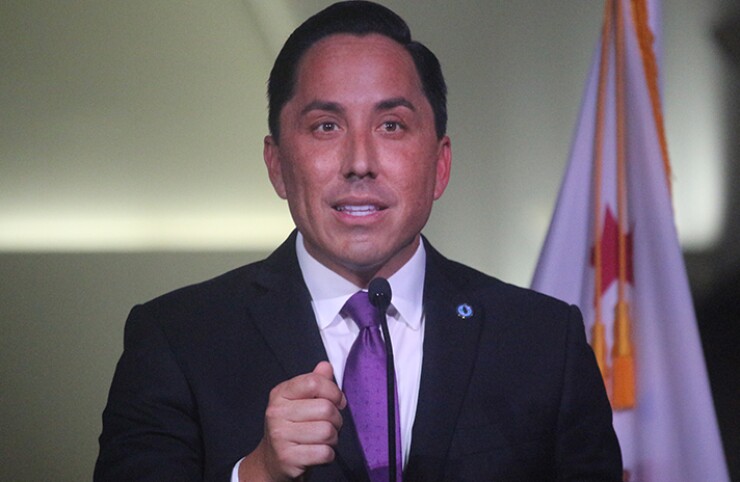Proposed San Diego sales tax bump seen as structural deficit, project backlog fix
3 min read

San Diego voters will be asked in November to approve a one-cent sales tax increase to resolve a structural deficit and pay for a long list of infrastructure and road projects.
The City Council voted unanimously on Monday to place the measure, which is expected to raise $400 million annually, on the ballot.
A county-wide half-cent sales tax increase to pay for transportation projects has also been proposed for the November ballot. If both measures pass, the city’s sales tax rate will rise to 9.25% from its current 7.75% rate.
“This new funding would enable us to address multi-billion-dollar infrastructure needs and propel our city into the future,” said San Diego Mayor Todd Gloria.
San Diego Mayor’s Office
In addition to large budget deficits, the city will have
Revenues from the tax could be used to pay for repairs to streets, storm drains, parks, and libraries, plus strengthen the city’s police, fire and lifeguard services and boost efforts to address homelessness, Gloria said.
He and Councilmember Raul Campillo championed efforts to get the measure on the ballot.
The pair said last month sales tax revenues could be used to float bonds to pay for infrastructure projects.
Gloria justified the sales tax increase by saying the city has spent years studying how to fix the city’s streets and infrastructure, but made little progress because it didn’t have the money to make a significant dent in the backlog.
“Let’s not waste more time dreaming, planning and studying,” Gloria said. “Instead, let’s make the changes that we know we must make.”
The longer the city postpones making needed infrastructure repairs, the more expensive these repairs become, said Councilmember Marni von Wilpert, adding she didn’t want to burden the next generation with what could become an insurmountable challenge.
In addition to reducing the infrastructure backlog, the city needs the additional income to tackle a structural deficit or face “deep department and programmatic cuts,” said Councilmember Joe LaCava.
The city used one-time fixes, which councilmembers say will not be available again, to close a $167 million deficit when it approved its’ $5.46 billion budget in May.
Opponents are concerned the new revenue would be unrestricted and could be used to increase employee salaries rather than pay for infrastructure projects. The increase had strong support from city employee unions, whose representatives testified at the council meeting.
But not dedicating the measure to a specific purpose means it only needs a majority of voter support to prevail versus the two-thirds approval required for a measure aimed at funding a specific purpose.
A poll of 400 voters conducted by the city in May showed the hike would likely receive 58% support.
A separate ballot measure that would have raised millions of dollars for repairs to the city’s stormwater system was pulled Friday by its author, Council President Sean Elo-Rivera.
He attributed his decision to changes to ACA1, a statewide proposition headed for the November ballot, that would have made it easier for local tax increases to pass by reducing the voter threshold to 55%, rather than two-thirds.
“The rules we thought we would be playing by were changed and our coalition decided the most responsible thing to do is pause,” Elo-Rivera said in a statement.
He had first floated the idea of a ballot measure after the city was hit with







